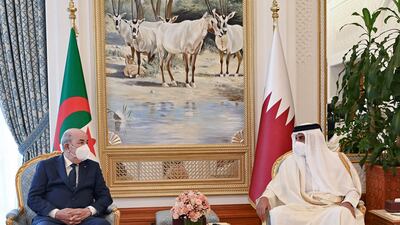Algerian President Abdelmadjid Tebboune has announced that Qatar and Kuwait are planning mega investments in the country.
Mega projects are generally considered to be far-reaching initiatives in energy, transport, agriculture or construction that will affect hundreds of thousands, even millions of lives, defined by a budget of more than $1 billion, but often running to far higher costs.
Mr Tebboune said the proposed projects would involve railways, agriculture, urban planning and the property market.
The government said it had been assigned to start preparing technical and feasibility studies to minimise unforeseen obstacles and set the stage for the projects of the two Gulf states.
Mr Tebboune chaired a Cabinet meeting on Sunday and kept the ministers posted on the outcome of his visits to Doha and Kuwait City last week.
The government has not revealed the total amount of investment pledged, but local media say tens of billions of dollars are expected to be channelled into infrastructure and urban planning projects.
No timetable for the projects has been given.
Chief among the new investments is the extension of railways from the capital Algiers to the southern city of Tamanrasset, a 700-kilometre line, and to the south-western city of Adrar, 190km away.
“This project will improve links within our cities as more than 70 per cent of the country’s 44 million people live in urban cities,” the head of Algeria’s Chamber of Commerce and Industry Al Tayib Shabab told the state news agency, Algerie Presse Service.
The Cabinet said other projects would create thousands of jobs in the sectors of agriculture and dairy production.
Qatar was the first Gulf state to be visited by the Algerian president since he took office in late 2019, when he was elected president after months of protests against the rule of veteran president Abdelaziz Bouteflika.
Protesters demanded free and fair democratic elections, the army’s withdrawal from politics and an end to corruption.
There are concerns about growing public grievances over a shortage of food staples and price rises over the past few months in the Opec member, which sits on Africa’s third largest proven oil reserves after Libya and Nigeria.
Parliament convened in January to debate and investigate the looming economic crisis, as the government accused unnamed business owners of running monopolies. The government said unspecified “suspicious parties” were recruiting children to buy large volumes of staple products for resale at inflated prices.
Algeria heavily subsidises staple food products such as cooking oil, milk and bread.
The north African country, the largest in the continent, relies heavily on oil and gas which accounts for more than 90 per cent of total export profits and 60 per cent of the state budget.
Despite recent rises in the oil price, the International Monetary Fund said Algeria needs $141 per barrel to balance its budget, a figure sometimes called the fiscal breakeven oil price.


